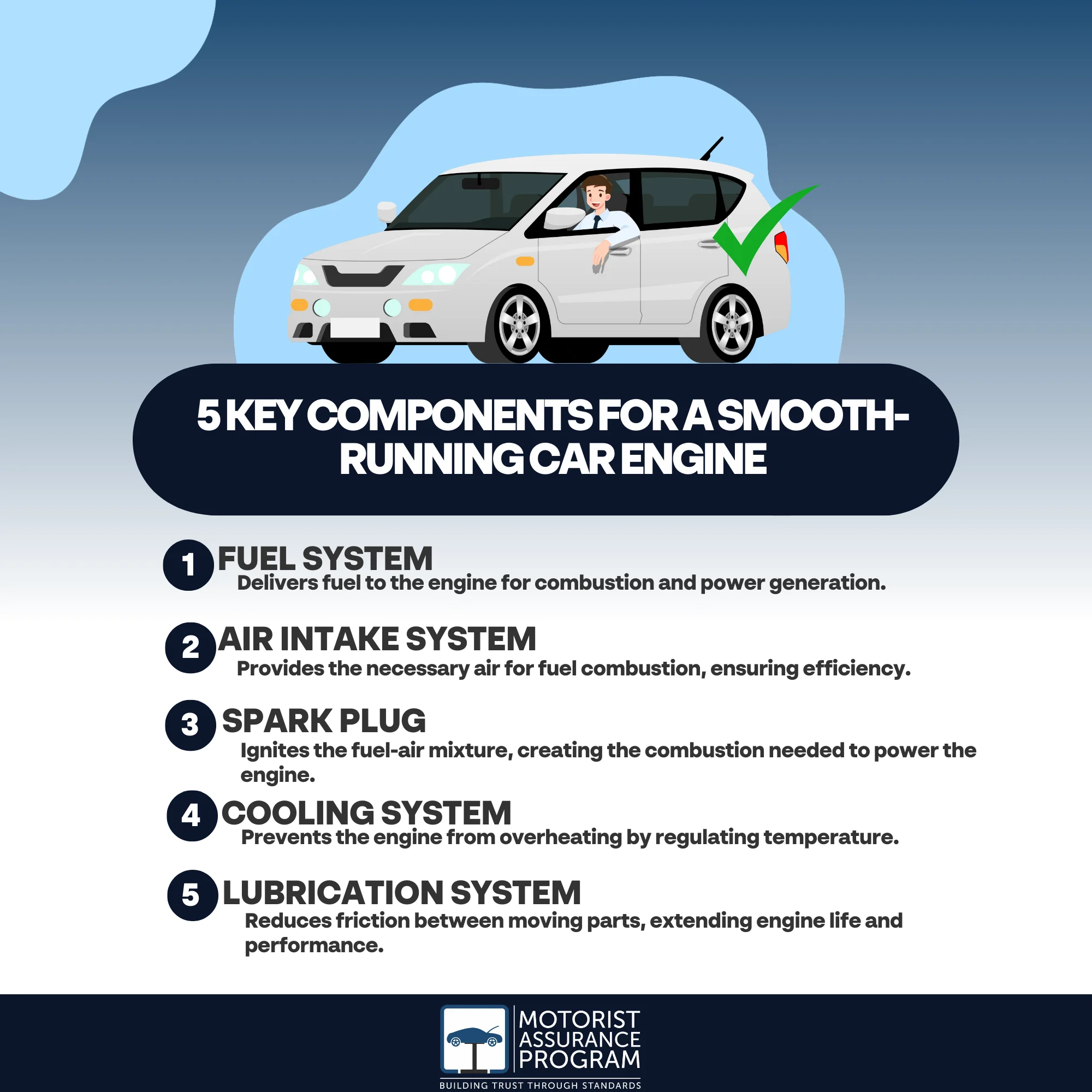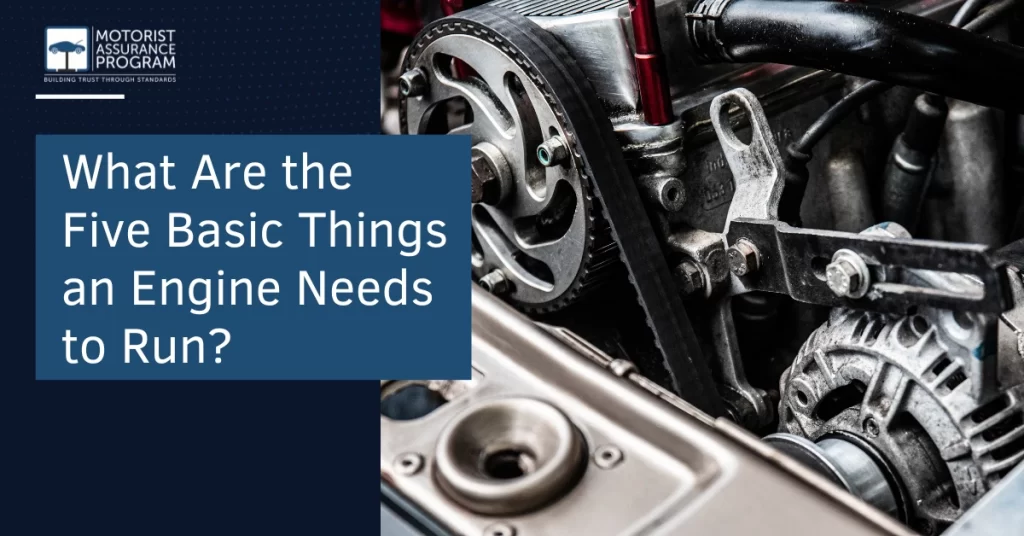To keep your engine running smoothly, you need five fundamental components working in concert. First, you need high-quality fuel to power the combustion process. Second, an ample and clean air supply is essential for peak combustion efficiency. Third, the spark ignition initiates the combustion cycle, so reliable spark plugs are critical. Fourth, you’ll need a functionally and mechanically sound engine for the whole operation to work. Finally, a robust cooling and lubrication system helps maintain your engine’s health. More details on the system mechanisms can give you a deeper understanding of such complex processes.

Key Takeaways
- An engine requires fuel, such as gasoline or diesel, to power the combustion process.
- A steady supply of air is vital for optimal combustion and engine efficiency.
- Spark ignition, typically provided by spark plugs, initiates the combustion cycle.
- Essential mechanical components, including the engine block and crankshaft, form the engine’s foundation.
- Proper functioning of the engine’s cooling, lubrication, and electrical systems is crucial for its operation.
Fuel: Powering the Engine’s Combustion Process
Fuel plays a critical role in powering your engine’s combustion process. It’s one of the essential things an engine needs to run. Without it, you’re not going anywhere.
But have you ever wondered how exactly does it work? Let’s break it down.
Fuel, which is usually gasoline or diesel, is stored in your vehicle’s fuel tank. From there, it gets pumped into the engine’s cylinders. This is where the magic happens. The fuel, combined with air, gets compressed by the pistons. This compression process creates heat, which ignites the fuel-air mixture and forces the pistons down. This movement is what ultimately powers your vehicle.
But fuel isn’t just fuel. It’s a complex mixture of hydrocarbons, additives, and sometimes ethanol.
The quality and type of fuel you use can greatly impact your engine’s performance and efficiency. High-quality fuel burns cleaner and more efficiently, reducing emissions and potentially extending your engine’s lifespan.
Air: Ensuring Optimal Combustion Efficiency
Just as vital to your engine’s operation is the steady supply of air. Air, your engine’s invisible ally, plays an important role in guaranteeing peak combustion efficiency.
The engine’s combustion chamber needs the right mix of air and fuel to function properly. Too little air can cause your engine to run rich, resulting in wasted fuel and increased emissions. Conversely, too much air can make your engine run lean, potentially leading to overheating and damage.
Your vehicle’s air intake system makes certain that the right amount of air reaches your engine. It filters out harmful debris and regulates the air supply based on your engine’s needs.
Regular vehicle care, including checking and replacing air filters, helps maintain this delicate balance. A well-maintained air intake system improves your engine’s performance and fuel economy.
So, don’t underestimate the power of air in your engine’s operation. It’s not just about the fuel you put in; the air that your engine breathes also needs attention.
Spark Ignition: Initiating the Combustion Cycle
In the same breath that we speak of air’s role in your engine, we must also emphasize the importance of spark ignition. Your engine needs to run smoothly, and spark ignition is essential to achieving this. It’s the spark that initiates the combustion cycle, the catalyst that sets off the chain of events that powers your vehicle.
Imagine the spark plug as a stage manager, giving the critical cue. At the perfect moment, a voltage is sent, releasing a spark across a gap. This spark ignites the fuel-air mixture in the engine’s combustion chamber, creating a mini explosion that pushes the piston down. It’s a simple yet crucial function, one that requires precision and consistency.
But it’s not all about sparks. Proper vehicle care extends to maintaining your spark plugs. Worn out or dirty spark plugs can cause misfires, reducing your engine’s performance and fuel efficiency.
Regular checks and replacements guarantee a strong, consistent spark, maintaining peak engine performance.
Engine Components: The Mechanical Foundation
Peering under your vehicle’s hood, you’ll find a complex mechanical landscape, the heart of which is the engine. This mechanical marvel, made up of numerous engine components, is the backbone of your vehicle’s operation.
Understanding these engine components is essential for vehicle care. The engine block, the stout structure housing the cylinders and other parts, is the foundation. You’ll find the cylinder head atop the block, containing important components like intake and exhaust valves.
The crankshaft, converting linear motion into rotational movement, is significant for propelling your vehicle. The pistons, enclosed within the cylinders, work in perfect harmony with the crankshaft. The connecting rods link the pistons and the crankshaft, guaranteeing their synchronized movement.
The camshaft, controlling valve operation, and the timing belt, which synchronizes the camshaft and crankshaft, are fundamental for seamless engine performance. Other elements like the spark plugs and fuel injectors, although discussed in other subtopics, are integral components as well.
Regular checks and maintenance of these components are part of vehicle care. Investing time in understanding these engine components and following maintenance tips helps guarantee your vehicle’s peak performance and longevity.
Cooling and Lubrication Systems: Maintaining Engine Health
Beyond the complexities of the engine’s mechanical foundation, you’ll find two significant systems that greatly contribute to maintaining engine health: the cooling and lubrication systems.
Your vehicle’s cooling system is tasked with regulating engine temperature. It accomplishes this by circulating coolant through the engine block, absorbing heat, and then dissipating it through the radiator. Without this system, your engine could overheat, leading to severe damage.
Alongside the cooling system, the lubrication system plays an important role in preventing excessive wear and tear. This system provides an oil film between moving parts, reducing friction and controlling engine temperature. High-quality engine oil and regular oil changes are essential for maintaining this system.
These two systems guarantee your engine runs smoothly, extending its lifespan. Significant vehicle care includes monitoring coolant levels, maintaining the radiator, and timely oil changes.
Trust in service providers is key in maintaining these systems as they possess the technical expertise to diagnose and resolve issues. Understanding these systems and their importance leads to better vehicle care, enhancing the performance and longevity of your vehicle.
Electrical Systems: Powering Engine Operations
Electrical systems ignite the lifeblood of your vehicle’s engine. They’re one of the 5 things an engine needs to run, and without them, you’d be left stranded. Let’s explore into the intricate operations of these systems.
The electrical system provides the spark that ignites the air-fuel mixture within the combustion chamber. This spark is essential, as it initiates the power stroke that ultimately turns the wheels. Without this spark, the three things an engine needs to run – air, fuel, and ignition – couldn’t combine to create the combustion process.
The battery, alternator, and starter make up the three main components of the electrical system. The battery provides the necessary energy to power the starter, which then cranks the engine.
Once the engine is running, the alternator takes over, supplying the electrical energy needed for the ignition system, fuel system, and other electrical devices.
Understanding the role and operations of the electrical system in your vehicle is fundamental for maintaining peak performance. It’s imperative to guarantee each component is in good working order to keep your vehicle’s engine running smoothly.
Exhaust Systems: Managing Emissions and Enhancing Performance
When you start your car, your exhaust system gets to work, playing an essential role in managing emissions and enhancing performance. This complex network, one of the 3 things an engine needs to run, is often overlooked. Yet, it’s indispensable for your car’s functionality.
Firstly, it’s vital in controlling the emissions released by your engine, reducing environmental pollution. The exhaust gases, once produced by the combustion process, are directed away from the engine through the exhaust manifold. They then pass through the catalytic converter, where harmful substances like nitrogen oxides, carbon monoxide, and unburned hydrocarbons are transformed into less harmful ones.
Secondly, the exhaust system enhances your car’s performance. It does so by ensuring ideal back pressure levels. Too much back pressure can cause your engine to work harder, reducing power and fuel efficiency. Conversely, too little can harm your engine’s ability to control the flow of exhaust gases, also affecting performance.
Lastly, it dampens the noise generated by the exhaust gases. The muffler, an integral part of the system, is designed for this purpose. Consequently, your car runs smoother and quieter.
Transmission Systems: Transferring Power to the Wheels
While you may not think about it often, your car’s transmission system is essential for transferring power from the engine to the wheels, making it one of the five crucial things an engine needs to run.
This system harnesses the engine’s power, modulating it to guarantee the right amount reaches your wheels. It’s a complex network of gears and shafts, working in harmony to keep you moving.
The transmission can be either manual or automatic. In a manual system, you control the gears with the clutch and gear stick. The automatic transmission, on the other hand, adjusts the gears automatically based on the vehicle’s speed and load.
Your transmission system needs regular maintenance to keep it running smoothly. This includes replacing the transmission fluid at intervals recommended by your vehicle’s manufacturer.
This fluid lubricates the gears and prevents overheating.
Frequently Asked Questions
What Kind of Maintenance Does the Engine Control Unit Require?
Your engine control unit (ECU) doesn’t need regular maintenance. However, if you’re experiencing performance issues, it’s worth checking. Professionals can reprogram it or fix any wiring issues, ensuring your engine runs smoothly.
How Often Should an Engine Timing Belt Be Replaced?
You should replace your engine’s timing belt every 60,000 to 100,000 miles. It’s vital, as a worn belt can cause serious engine damage. Always consult your vehicle’s manual for specific recommendations.
Can I Improve Fuel Efficiency by Using Premium-Grade Gasoline?
You can’t necessarily improve fuel efficiency by using premium-grade gasoline. Your car’s engine design determines the best fuel type. Premium gas benefits high-performance engines, but for most vehicles, regular-grade is just as effective.
What Are Common Symptoms of a Failing Engine Oil Pump?
You might notice decreased oil pressure, increased engine temperature, or noise under the hood. If your oil warning light flickers, it’s a clear sign that your engine oil pump could be failing.
How Does the Engines Computer System Affect Its Performance?
Your engine’s computer system, or ECU, greatly impacts its performance. It controls fuel injection, ignition timing, and idle speed. If it’s malfunctioning, you’ll notice decreased fuel efficiency, power, and smoothness in overall vehicle operation.
Conclusion
So, just like a symphony orchestra needs each instrument to play its part perfectly for a harmonious performance, your engine needs fuel, air, spark, compression, and timing to run smoothly. Understanding these components can make you a maestro in car maintenance, helping you hit the right note when it comes to vehicle repair decisions. Remember, knowledge is power, and in this case, it’s the power to keep your engine humming and your journey safe.


